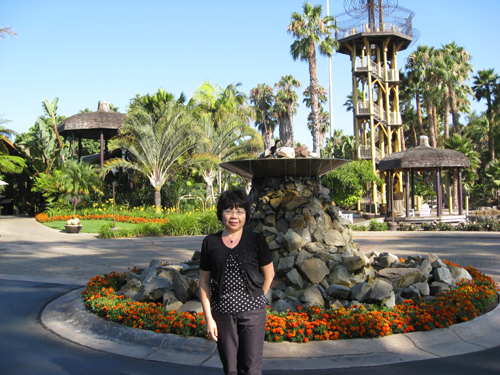

Xuan Wang:Ph.D,Professor
Tel: +86-10-82806818(O),+86-10-82801711(L)
Fax:+86-10-82806818(O)
E-mail: xuanwang6818@bjmu.edu.cn
Address: Department of Chemical Biology, School of Pharmaceutical Sciences,Peking University, Beijing 100191, China
Education
Mar.1986~Mar.1989
Ph.D. degree at Toyama Medical and
Nov.1985~Mar.1986
Advanced students at Toyama Medical and
Sep.1982~Oct. 1985
Master’s degree at
Oct.1978~Jul.1982
B.Sc. degree at
Professional Background
Mar.1999~present
Professor of Pharmaceutical Analysis,
Dec. 2010~present
The Member of the 10th Pharmacopoeia Commission of the People’s Republic of
Jun. 1998~Mar.1999
Professor of Pharmacognosy,
Apr. 1989~Sep.1989
Visiting Researcher at Research Institute for Wakan-Yaku,
Oct.1985~Nov.1985
Assistant, Department of Pharmacognosy,
Teaching
l Courses: Advanced pharmaceutical analysis(for graduate students)
Biopharmaceutical analysis(for graduate students)
pharmaceutical analysis(for undergraduate students)
l Textbook: < pharmaceutical analysis>, China Medical Science Press, Sept. 2010,
< pharmaceutical analysis>, People’s Medical Publishing House, 2011
< pharmaceutical analysis exercises and learning guide>, China Medical Science Press, Sept. 2010
Research Interests
l Research experience
Responsible for and participate in research projects: “the General Program and Key Program of National Natural Science Foundation of China”, “National Program on Key Basic Research Project of China (973 Program)”;“National Programs for Science and Technology Development”, “National Key Technology Research and Development Program of theMinistry of Science and Technology of China”.
l Research Interests
1. Pharmaceutical analysis in biological samples;
2. Quality evaluation of Chinese traditional medicines
2006, won the First Prize of Scientific and Technological awarded by China Association of Chinese Medicine.
1997, won the Third Prize of the State Scientific and Technological Progress.
1996, be won the First Prize of Scientific and Technological Progress awarded by
the State Administration of Traditional Chinese Medicine.
1. Sesquiterpene and Aristolochic Acid Derivatives from Thottea hainanensis, Helvetica Chimica Acta – Vol. 93:354-360 (2010), Shi-Wen Dong,Xuan Wang*, Ming-Ying Shang, Chao-Mei Ma, Shu-Xiang Zhang, Xiao-Wei Lia, Min-Juan Xu, Shao-Qing Cai* , and Tsuneo Namba
2. 5–Methoxyaristololactam I, the First Natural 5–Substituted Aristololactam from Asarum ichangense ,Natural Product Communications, 2011, 6 ( 1): 11 - 14 Bai–Bo Xie,, Ming–Ying Shanga, Kuo–Hsiung Lee, Xuan Wang, Katsuko Komatsuc and Shao–Qing Cai
3. Chemical constituents fromSaruma henryi. J Chin Pharm Scien. 2009,18(2):110~114 Shi-Wen Dong, Ming-Ying Shang, Xuan Wang*, Shu-Xiang Zhang, Chen Li, Shao-Qing Cai
4. A new aristololactam from Asarum maximum J Chin Pharm Scien. 2009,18:183~185. Jie Yu, Chao-Mei Ma , Chang-Feng Long , Xuan Wang , Ming-Ying Shang , Shao-Qing Cai , Masao Hattori , Tsuneo Namba
5. Pharmacokinetica studies of aristolochic acid-I and -II in rats after intragastricaladministration of Radix Aristolochiae and Muskone J Chin Pharm Scien. 2009,18:79~83.Pema Dolma, Dong-HuiYang , Jie Yu, Xuan Wang, Shao-Qing Cai
6. A new aristolochic acid derivative from Asarum himalaicum. Acta Pharmaceutica Sinica 2011, 46 (2): 188-192 XIE Bai-bo, SHANG Ming-ying*, WANG Xuan, CAI Shao-qing*, Kuo-hsiung LEE
7. Chemical Constituent from the Fruit of Aristolochia contorta. China J of Chinese Materia Medica, 2010,35(21): 2862-2865. Yu-Qiong Xu,Ming-YingShang,Yue-WeiGe, XuanWang,Shao-QingCai
8. Aristolochic Acid Nephropathy: Variation in Presentation and Prognosis,nephrol dial transplant, 2011,Li Yang 1& and Tao Su 1&, Xiao-Mei Li 1*, Xuan Wang2, Shao-Qing Cai2, Li-Qiang Meng1, Wan-Zhong Zou 3, Hai-Yan Wang1
9. Anti-inflammatory and anti-nociceptive effects in mice of the water and ethanol extracts of the roots and rhizomes of Asarum heterotropoides var. mandshuricum, China J of Chinese Materia Medica, 2009,34(17):32~37 Xiong Yulan, Jing Yu, Shang Mingying, Li Changling, Ye Jia, Wang Xuan, Cai Shaoqing
10. Production, Characterization of a Monoclonal Antibody against Aristolochic Acid-II and Development of its Assay System. The American Journal of Chinese Medicine, Vol. 36, No. 2, 425– 436, 2008. Min Tian, Hiroyuki Tanaka, Ming-Ying Shang, Seiko Karashima, Zhi Chao, Xuan Wang, Shao-Qing Cai and Yukihiro Shoyama
11. Cytotoxic activity of some Asarum plants. Fitoterapia, 79 (2008) 293–297.Shao-Qing Cai,*,Jie Yu,Xuan Wang , Rui-Qing Wang, Fu-Xiang Ran, Ming-Ying Shang, Jing-Rong Cui, Katsuko Komatsu, Tsuneo Namba
12. Observation of penetration,distribution and accumulation in human renal proximal tubular epithelial cells by aristololactam-I,China J of Chinese Materia Medica, 2008,33(7):793~797. SHANG Pu, WANG Xuan*, LI Xiao-Mei*, TANG Jia-Wei, CAI Shao-Qing
13. Studies on sofid phase extraction method of aristolochic acids and aristololactams in rat urine,China J of Chinese Materia Medica, 2007,32(24):2613~2619.ZHAO Dian.hong,QU Lei,WANG Xuan*,LI Xiao mei,XU Jun yu,CAI Shao qing
14. Several Factors Affecting the HPLC-Fingerprinting of Panax notoginseng. Chin J Nat Med, 2(1): 33~41,J.LI, X.WANG, F.-Y. MA, X.-H. JIA, S.Q.CAI*, X.-M. LIANG and K.KOMATSU
15. Cytotoxicity of Phenanthrenes Extracted from Aristolochia contorta in Human Proximal Tubular Epithelial Cell Line. Nephron Exp Nephrol 2006, 103:e95~ e102. Yu-jie Wen,Tao Su,Jia-wei Tang,Cui-ying Zhang,Xuang Wang,Shao-qing Cai,Xiao-mei Li*
16. Simultaneous Determination of Five Aristolochic Acids and Two Aristololactams in Aristolochia Plants by High performance Liquid Chromatography. Biomedical Chromatography, 2006, 20:309~318 C.-Y.Zhang, X. Wang, M.-Y. Shang, J. Yu, Y.-Q Xu, Z.-G. Li, L.-C. Lei, X.-M. Li, S.-Q. Cai1 * and T. Namba
17. New aristolochic acid, aristololactam and renal cytotoxic constituents from the stems and leaves of Aristolochia contorta . DIE PHARMAZIE , 2005, 60(10): 785~788. C.-Y. Zhang, X. Wang, T. Su, C.-M. Ma, Y.-J. Wen, M.-Y.
Shang, X.-M. Li, G.-X. Liu, S.-Q. Cai *
18. Affection of Different Preparations on the Content of Toxic Constituents in Traditional Chinese Medicines, Examplified with Caulis Aristolochiae Manshuriensis. China J of Chinese Materia Medica, 2005, 30(11):835~839. C.-Y. Zhang, X. Wang, M.-Y. Shang, J.Yu, J.-Y. Xu, Z.-G. Xu,X.-M. Li, S.-Q. Cai and T. Namba
19. Analysis of the Constituents in the Chinese Drug Notoginseng by Liquid Chromatography-Electrospray Mass Spectrometry. J Chin Pharm Scien,2004,13(4):225~237. J.-H. Liu , X. Wang*, S.-Q. Cai,K. Komatsu and T. Namba
20.Cellular Mechanism of Renal Proximal Tubular Epithelial Cell Injury Induced by Aristolochic Acid I and Aristolalactam I. J of
21. Shao-Qing Cai, Xuan Wang(Chief Editor). <Species Systematization and Quality Evaluation of Commonly Used Chinese Traditional Drugs>, North-China Edition Vol.VI,Beijing Medical University Press,2003.